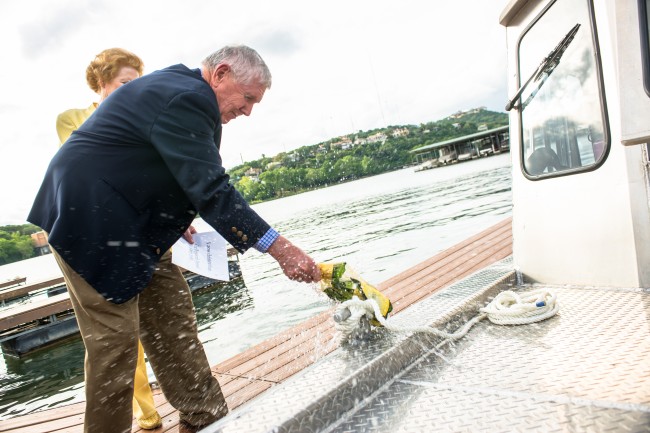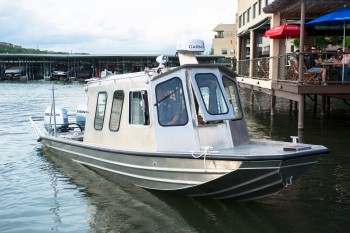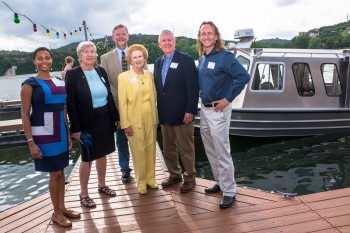The Jackson School Sets Sail in New Research Vessel
April 29, 2015

“I christen this boat the Research Vessel Scott Petty!”
With these words—followed by the crack and spray of a bottle of champagne across the hull—the Jackson School of Geoscience’s new coastal research vessel was officially named by Scott and Eleanor Petty of the Scott Petty Foundation at a christening ceremony on April 22.
The 26-by-8-foot boat, a gift to the school from the foundation, was unveiled to members of the Jackson School community at the ceremony bobbing in a small sheltered marina on Lake Austin. But in less than a month after being christened, the boat will be on to bigger waters and a greater purpose—furthering geoscience research and education.

Professor Dave Mohrig and his research group will bring the boat to Louisiana in the beginning of May to research the Wax Lake Delta system. And by the end of that same month the boat will be brought to the Gulf of Mexico for a marine geology & geophysics field course.
These two excursions are just the beginning of the school’s plans for the boat, Jackson School Dean Sharon Mosher said at the christening celebration.
“This vessel is a wonderful gift to all of us that will be used by all of the units within the Jackson School,” Mosher said. “It will be used in the next decade for research, as well as more teaching and our rapid response program, where we go out and look at what catastrophic processes happen when you have a storm or a hurricane.”
Since the majority of geophysical phenomena happens in parts of the planet covered with water, a research vessel is an essential tool for improving our understanding of the planet, said Terry Quinn, director of the school’s Institute for Geophysics (UTIG).
“Earth is covered two-thirds with water, and I see suburbans parked in front of the geology group and say ‘this is fantastic we can study one-third of the Earth,” Quinn joked. “Now we have a vessel that can study some of the oceans and nearshore areas, so I’m ecstatic.”
The Scott Petty Foundation, which donated the boat and started an endowment to pay for its maintenance, has a history defined by geophysics. Petty’s father, Olive Scott Petty founded the Petty Geophysical Engineering Company, one of the first seismic service companies in the oil industry, and invented many early geophysical instruments, a selection of which are on display in the Jackson School.
“Geophysics has been our life, and I hope it will be for some of you all as well,” Petty said. “We’ve come a long way.”
In addition to the foundation, the boat is also supported by ConocoPhillips, which has provided funding for its scientific equipment, and ExxonMobil, which is funding a safety program for the vessel.

Pictured left to right: Associate Director of Corporate and Foundation Relations Jazmine Leon-Wing; Jackson School Dean Sharon Mosher; UTIG Director Terry Quinn; Eleanor Petty and Scott Petty of the Scott Petty Foundation; UTIG research associate professor Sean Gulick.
The research vessel replaces the school’s previous boat, which left with the faculty member who owned it last year. According to Dan Duncan, the boat’s captain and UTIG scientist, the new vessel has features that improve the experience of conducting science at sea. It is battery powered, which eliminates the sounds and smells of a gas-powered generator, and it has more cabin space.
“The configuration is a more modern, more comfortable environment,” Duncan said.
Before heading on its maiden voyage, the R.V. Scott Petty will be outfitted with instruments such as a multibeam and sidescan sonars, a chirp subbottom system profiler, and an acoustic Doppler current profiler. In addition, all data collected by the boat will be precisely time-stamped and geographically tagged, thanks to a position and motion sensor on the vessel.
“The boat as you see it is the bare bones, but what it’s set up for is to tow all sorts of equipment to map the seafloor, measure the currents, map the subseafloor in very high resolution,” said Sean Gulick, a UTIG research associate professor.
This equipment is what scientists will use when conducting research, and what students will learn to operate in the marine geology & geophysics class. According to Quinn, these sorts of experiences can ignite a simple interest in geology into something more.
“Geology is an experiential learning field,” Quinn said. “Through experiences you can take someone who is interested and make them passionate.”
More information on Jackson School field experiences. More information on Jackson School endowments.
